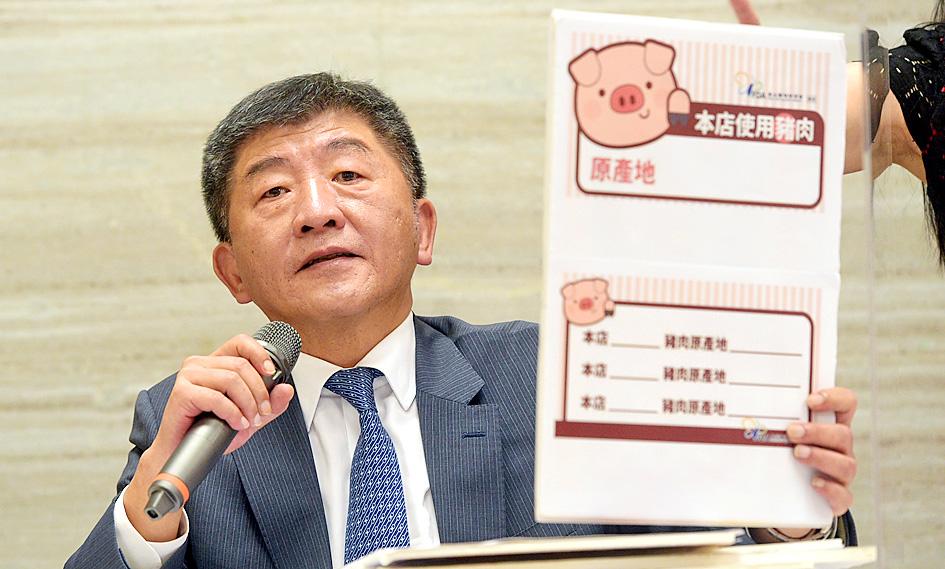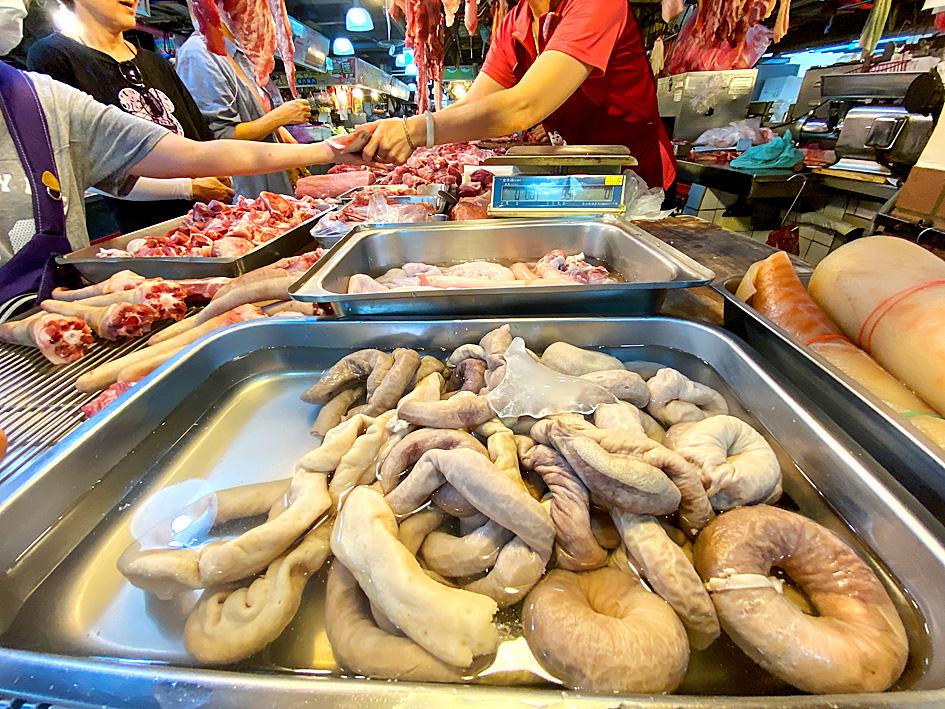The Ministry of Health and Welfare yesterday announced the maximum residue limits (MRLs) for US pork containing ractopamine: 0.04 parts per million (ppm) for liver and kidneys, and 0.01ppm for all other parts of the animal.
Minister of Health and Welfare Chen Shih-chung (陳時中) said that to protect people’s health, the MRLs for US pork containing ractopamine were based on scientific evidence and health risk assessments.
President Tsai Ing-wen (蔡英文) on Aug. 28 announced that the government would lift bans on US pork containing ractopamine and US beef from cattle more than 30 months old. The policy is scheduled to take effect on Jan. 1 next year.

Photo: Chang Chia-ming, Taipei Times
A food hygienic safety and nutrition consultative council was convened by the ministry on Friday to discuss the appropriate MRLs for Taiwan.
“The MRL for ractopamine residue in pork will be set at 0.04ppm for pork liver and kidneys, and 0.01ppm for pork fat and all other edible parts,” Chen said.
In other countries, most of the MRLs for ractopamine in kidneys are set at 0.09ppm or higher, but the MRL for kidneys in Taiwan would be 0.04ppm, because the council took into consideration that it is customary in Taiwan for new mothers to eat liver and kidneys, he said.

Photo: CNA
The MRL for pork liver would also be set at 0.04ppm, he said, adding that the Codex Alimentarius Commission advises an MRL of 0.04ppm, which Japan, South Korea, New Zealand and Canada adhere to, while the US and Australia use MRLs of 0.15ppm and 0.2ppm, respectively.
While US beef from cattle more than 30 months old would be allowed to be imported, beef parts with a higher risk of containing bovine spongiform encephalopathy (BSE), commonly known as mad cow disease, would still be banned, Chen said.
Beef parts with a high BSE risk include the skull, brains, eyes, spinal cord, ground meat and internal organs, the ministry said.
The ministry referred to 2018 data evaluating the health risk of eating beef from cattle of all ages, and on Tuesday consulted BSE specialists, who agreed that lifting the ban on beef from cattle aged 30 months or older would be safe, Chen said.
Meanwhile, starting from Jan. 1, all pork products, including braised pork rice or meatball soup, sold anywhere — including traditional markets and food stalls — must be legibly marked with the country of origin, Chen said.
The country of origin must be labeled on prepackaged foods, signs marking the countries of origin must be put out for bulk pork products, and food stalls and restaurants would be required to put up clearly visible signs that state the country of origin of their pork dishes, Chen said.
He said that after the ministry officially announces the standards, it would set up demonstration areas nationwide to promote correct labeling methods and collect suggestions from stores.
The Food and Drug Administration (FDA) would also implement a tracing system to verify the accuracy of labels, he added.
Chen said that companies that fail to legibly mark the country of origin of their pork products would face a fine of NT$30,000 to NT$3 million (US$1,016 to US$101,568), while those who falsify their labeling would face a fine of NT$40,000 to NT$4 million, according to the Act Governing Food Safety and Sanitation (食品安全衛生管理法).
FDA Director-General Wu Shou-mei (吳秀梅) said that a fine of NT$60,000 to NT$200 million could be given to suppliers of pork products that do not meet the MRL standards for ractopamine.

The US government has signed defense cooperation agreements with Japan and the Philippines to boost the deterrence capabilities of countries in the first island chain, a report by the National Security Bureau (NSB) showed. The main countries on the first island chain include the two nations and Taiwan. The bureau is to present the report at a meeting of the legislature’s Foreign Affairs and National Defense Committee tomorrow. The US military has deployed Typhon missile systems to Japan’s Yamaguchi Prefecture and Zambales province in the Philippines during their joint military exercises. It has also installed NMESIS anti-ship systems in Japan’s Okinawa

‘WIN-WIN’: The Philippines, and central and eastern European countries are important potential drone cooperation partners, Minister of Foreign Affairs Lin Chia-lung said Minister of Foreign Affairs Lin Chia-lung (林佳龍) in an interview published yesterday confirmed that there are joint ventures between Taiwan and Poland in the drone industry. Lin made the remark in an exclusive interview with the Chinese-language Liberty Times (the Taipei Times’ sister paper). The government-backed Taiwan Excellence Drone International Business Opportunities Alliance and the Polish Chamber of Unmanned Systems on Wednesday last week signed a memorandum of understanding in Poland to develop a “non-China” supply chain for drones and work together on key technologies. Asked if Taiwan prioritized Poland among central and eastern European countries in drone collaboration, Lin

BACK TO WORK? Prosecutors said they are considering filing an appeal, while the Hsinchu City Government said it has applied for Ann Kao’s reinstatement as mayor The High Court yesterday found suspended Hsinchu mayor Ann Kao (高虹安) not guilty of embezzling assistant fees, reducing her sentence to six months in prison commutable to a fine from seven years and four months. The verdict acquitted Kao of the corruption charge, but found her guilty of causing a public official to commit document forgery. The High Prosecutors’ Office said it is reviewing the ruling and considering whether to file an appeal. The Taipei District Court in July last year sentenced Kao to seven years and four months in prison, along with a four-year deprivation of civil rights, for contravening the Anti-Corruption

NO CONFIDENCE MOTION? The premier said that being toppled by the legislature for defending the Constitution would be a democratic badge of honor for him Premier Cho Jung-tai (卓榮泰) yesterday announced that the Cabinet would not countersign the amendments to the local revenue-sharing law passed by the Legislative Yuan last month. Cho said the decision not to countersign the amendments to the Act Governing the Allocation of Government Revenues and Expenditures (財政收支劃分法) was made in accordance with the Constitution. “The decision aims to safeguard our Constitution,” he said. The Constitution stipulates the president shall, in accordance with law, promulgate laws and issue mandates with the countersignature of the head of the Executive Yuan, or with the countersignatures of both the head of the Executive Yuan and ministers or